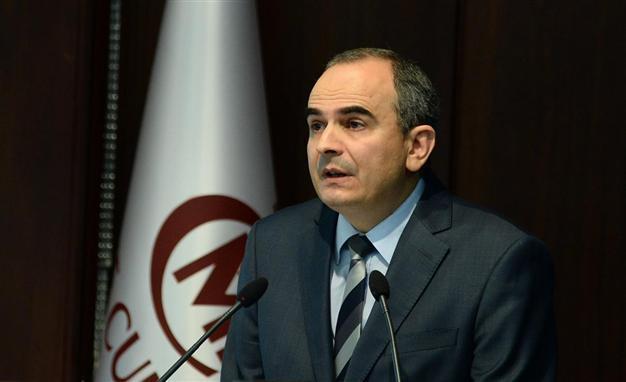Turkish Central Bank seeks to save reputation with secret rate cut
Uğur Gürses Hürriyet/ISTANBUL

'There is no need for the Monetary Policy Committee to convene, as we can pull this [interest rate] down to 10 percent gradually, if necessary,' the Central Bank's head Erdem Başçı had said April 7. DAILY NEWS Photo
Despite displaying a tough stance to the markets, Central Bank Gov. Erdem Başçı appeared to start making necessary liquidity adjustments for a rate cut, following the prime minister’s call.After Prime Minister Recep Tayyip Erdoğan asked the Central Bank to convene immediately and reduce interest rates on Friday, the bank loosened monetary tightening as of Monday to enable overnight interest rates to drop by nearly 2 points.
“There is no need for the Monetary Policy Committee to convene, as we can pull this [interest rate] down to 10 percent gradually, if necessary. We have room to maneuver here,” Başçı had said on Monday, speaking at a presentation in the Central Anatolian province of Kayseri.
While markets were expecting this to happen at some point in the future, it emerged that the Central Bank had already taken action when Başçı was hinting at the possibility of the move.
The Central Bank was giving 90 percent of the Turkish Lira liquidity that the market needs through one-week repo at a 10 percent fixed interest rate. After providing much of their needs by one-week repo, they were borrowing money from the Central Bank at a 11.5 to 12 percent overnight lending rate to procure the rest. Therefore, overnight interest rates weren’t falling below 11.70 percent at the interbank repo market established at Borsa Istanbul.
When the Central Bank ramped up the amount of money it gives at 10 percent interest rate on April 7, banks did not need to borrow from the overnight market at 11.5 to 12 percent rates on April 8 and 9.
As a result, overnight interest rates dropped below 10 percent on April 9.
So it looks like Erdem Başçı fulfilled Erdoğan’s wish right away, while giving tough stance signals to the markets. Bankers think Başçı winked at both markets and the government at the same time, by not giving an interest rate reduction signal, but cutting the 12 percent interest rate by 2 points in practice.
The Central Bank’s starting of liquidity adjustments that will reduce rates after the prime minister’s “cut” remark is perceived as an act of sliding toward regaining its lost reputation.
Actually, what hiked interest rates to 12 percent and kept them there was the concern of retrieving this reputation, as well as stabilizing the foreign exchange rate.
The Central Bank was strong enough to ease this extra tightening whenever it wants, as the capital influx into emerging markets in the past two weeks had pulled the foreign exchange currency rate down. However, it was too early for this maneuver in the path to recovering the Bank’s reputation.
Meanwhile, when it hiked the rates on Jan. 28, the bank had said that the main funding interest rate of 10 percent would remain until remarkable progress in inflation is achieved. But there is no remarkable inflation recovery on the horizon.
















